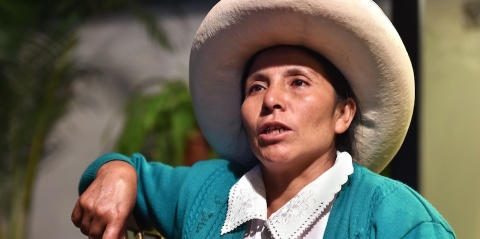Last Year’s Goldman Prize Winner Was Murdered. Could This Year’s Winner Be Next?
Published by Foreing Policy
Máxima Acuña, the Peruvian campesina who just won a Goldman Prize for blocking a gold mine in rural Peru, broke down in tears as she described watching workers from the Yanacocha mining company run over eight of her sheep in their trucks four years ago. “I’m not crying out of cowardice, and I’m not crying because people feel bad for me,” she toldForeign Policy in an interview last week in Washington. “I’m crying because of everything that I’ve suffered.”
Acuña owns a small farm and has never learned to read or write. Yet she was awarded the Goldman Environmental Prize this month for stopping Yanacocha, a subsidiary of U.S.-based mining company Newmont, from constructing a gold mine that would have drained four nearby lakes and destroyed the water supply for thousands of people. She did so by refusing to leave her land despite harassment, threats, and lawsuits filed against her by the company. The Goldman Prize is the world’s most prestigious award for environmental activists.
One of last year’s Goldman Prize winners, Honduran activist Berta Cáceres, was killed in her home in March. Honduras and Peru, where Acuña lives, rank within the top five most dangerous countries in the world for environmental activists, according to Global Witness. Like Cáceres, the 46-year-old has experienced years of death threats — they come almost monthly, she says. On Sunday night, as Acuña was en route home from receiving the prize in San Francisco and Washington, her husband called to say that shots were fired over their house.
Acuña told FP that in 2010 and 2011, Newmont’s private security and state police officers contracted by the company took all of her belongings and burned down the straw huts where she and her family lived. Since then, she said she has received more death threats than she can count and has seen her animals killed and her crops pulled up. She also said that Newmont fenced in her land and installed checkpoints with 24-hour security installed on either side. Despite winning her court appeal, she said, not much has changed.
“I thought that we would have a little more peace, that we’d be able to make our life, but it wasn’t like that,” she said. “They keep attacking.”
In February, Newmont announced it would indefinitely suspend the mining project, known as Conga. But the company continues to maintain its security apparatus around Acuña’s land, according to her lawyer and the advocacy group Frontline Defenders, and continues to pursue her with legal action in civil court.
In a phone interview, Newmont press secretary Omar Jabara disputed Acuña’s version of the story, saying it is laced with falsehoods.
“We couldn’t have destroyed her house in 2010, because she had no presence on the property before 2011,” he told FP. He accused Acuña and her family of moving to the land then in search of a payout from the company, which he said bought the property legitimately in 1996 and 1997 from the campesino community that occupied it. Acuña’s lawyer, however, said documents showing she bought the land in 1994 have already been presented in court.
Payal Sampat, who directs the mining program at Earthworks, a Washington-based advocacy organization dedicated to improving practices in the mining industry, said she has seen Newmont go to extreme lengths to discredit detractors — not just in Peru, but in Ghana and Indonesia as well.
“I can tell you that Newmont does stand out in its efforts to attack and discredit its critics,” Sampat told FP. In 2007, the company’s Indonesian CEO even went so far as to sue the New York Times for publishing stories about water pollution caused by a mine in the country.
José de Echave, the former environment vice minister in Peru, quit his government position in 2011 in protest of what he called a flawed environmental impact study on the Conga mine. He told FP in a phone call this week that Acuña’s case was “a clear demonstration that the project does not have social support.”
Yet that has given Acuña little peace, especially in the wake of a law Peru’s government approved in 2014 giving legal immunity to police who kill or injure people — including protesters — while on duty. Just two years earlier, five people were killed in a protest against the Conga mine.
When asked about the immunity law being used against protesters, Jabara immediately tried to end the interview with FP. Later, he said he was not familiar with the law. “At the end of the day we don’t control what the police do,” he said. “They have their own chain of command and follow their own rules of engagement.”
Photo credit: CRIS BOURONCLE/AFP/Getty Images

Nosotros somos GRUFIDES!
Mantente en contacto
Contáctanos
info (@) grufides.pe
+51 076 34 2082
+51 976 465 169
RPM: #767539
Cajamarca - Perú






Agregar comentario